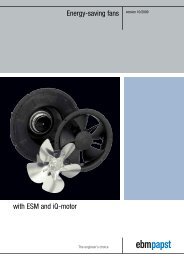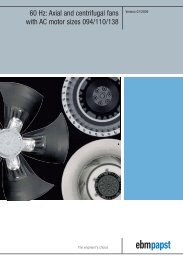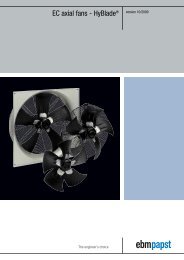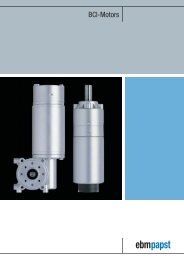Download [PDF] 2.1 MB - ebm-papst UK
Download [PDF] 2.1 MB - ebm-papst UK
Download [PDF] 2.1 MB - ebm-papst UK
You also want an ePaper? Increase the reach of your titles
YUMPU automatically turns print PDFs into web optimized ePapers that Google loves.
GAS VALVE<br />
Gas valve automatically<br />
optimises combustion<br />
Variations in the gas mixture no longer a problem<br />
Although modern gas heating systems operate<br />
efficiently and ecologically, new concepts are,<br />
nevertheless, called for in view of rising energy<br />
prices and more diverse raw material sources. For<br />
reasons of cost and to avoid shortages, gas is<br />
now increasingly being obtained from new suppliers.<br />
This can result in fluctuations in the gas<br />
composition, which in turn requires complex<br />
adjustment of the gas mixers to the particular<br />
calorific values of the gas currently being supplied<br />
in the case of conventional gas heating systems.<br />
A new gas valve with stepper motor control<br />
and electronic actuation now performs automatic<br />
adaptation to the quality of the gas. This permits<br />
rapid set-up of the heating system and at the<br />
same time avoids subsequent extra costs resulting<br />
from changes in the gas quality.<br />
Similarly to a car engine, a heating system<br />
only provides optimum performance when operating<br />
with a narrowly defined air-to-fuel ratio. In<br />
the case of natural gas, the so-called Lambda<br />
value (the gas-to-air ratio) is in the region of 1.3.<br />
The nitrogen content fluctuates considerably depending<br />
on the gas field and the amount of biogas<br />
fed in. Conventional mechanical mix regulators<br />
cannot provide compensation for such fluctuations<br />
and so have to be re-adjusted. By contrast,<br />
the new gas valve F01 from <strong>ebm</strong>-<strong>papst</strong> Landshut<br />
offers a convenient way of dealing with the problem<br />
of adjustment to different gas qualities: Electronic<br />
control obviates the need for manual setting.<br />
An ideal, economical, and ecological combustion<br />
process is always guaranteed.<br />
Natural gas from a variety of sources As<br />
a result of liberalisation of the gas market, gas<br />
companies are now obliged to allow other suppliers<br />
to pump gas through their networks. Potential<br />
shortages are avoided by mixing gas from<br />
various fields or feeding in biogas. The calorific<br />
value of the resultant gas mix often fluctuates<br />
considerably despite the limit values agreed upon<br />
by the gas companies. The consequence of this<br />
for the combustion process is that the amount of<br />
combustion air required has to be adjusted. In<br />
practice, switching from high-calorific (so-called<br />
H gas) to low-calorific natural gas (L or even<br />
LL gas) for instance results in heat output losses<br />
of a double figure percentage magnitude if the<br />
mixture ratio is not adapted accordingly. This is<br />
techmag 02°2013<br />
21


![Download [PDF] 2.1 MB - ebm-papst UK](https://img.yumpu.com/36174834/21/500x640/download-pdf-21-mb-ebm-papst-uk.jpg)


![Compact fans for AC and DC [PDF] - ebm-papst](https://img.yumpu.com/48610592/1/184x260/compact-fans-for-ac-and-dc-pdf-ebm-papst.jpg?quality=85)
![Download [PDF] 9.8 MB - ebm-papst Automotive & Drives](https://img.yumpu.com/47171334/1/184x260/download-pdf-98-mb-ebm-papst-automotive-drives.jpg?quality=85)

![Download [PDF] 3.1 MB - ebm-papst UK](https://img.yumpu.com/40847594/1/185x260/download-pdf-31-mb-ebm-papst-uk.jpg?quality=85)

![Download [PDF] 2.3 MB - ebm-papst UK](https://img.yumpu.com/35271378/1/190x252/download-pdf-23-mb-ebm-papst-uk.jpg?quality=85)
![Download [PDF] - ebm-papst UK](https://img.yumpu.com/35139755/1/190x135/download-pdf-ebm-papst-uk.jpg?quality=85)

![Download [PDF] 1.5 MB - ebm-papst UK](https://img.yumpu.com/30021941/1/184x260/download-pdf-15-mb-ebm-papst-uk.jpg?quality=85)
![DC fans - specials [PDF] 1.2 MB](https://img.yumpu.com/28121898/1/184x260/dc-fans-specials-pdf-12-mb.jpg?quality=85)
